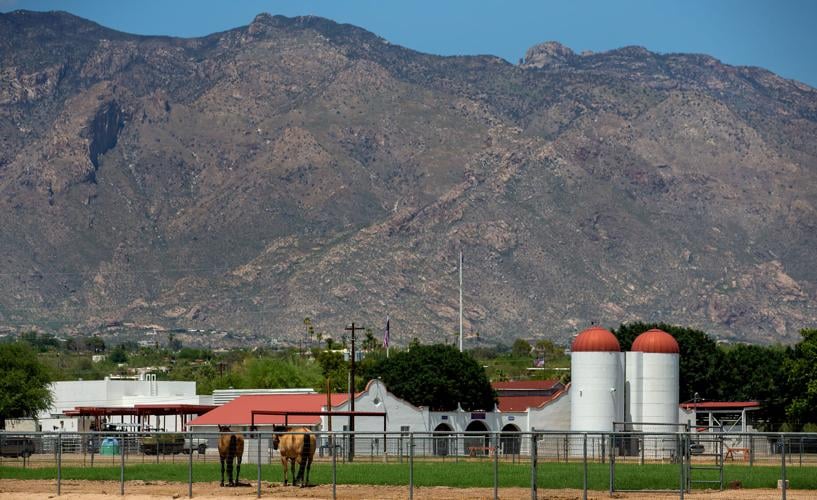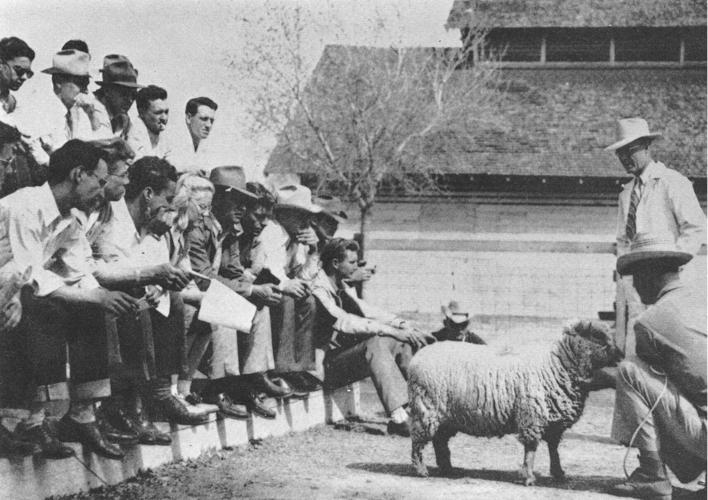Despite opposition from the University of Arizona, the Tucson City Council has initiated a process to consider UA’s Campus Agricultural Center for historic landmark designation.
The 160-acre agricultural center on North Campbell Avenue, commonly known as the “campus farm,” was built in 1909 to serve the UA’s College of Agriculture and help fulfill the university’s land-grant mission. It’s where students and faculty conduct hands-on research, like how to grow crops in arid climates — or on Mars.
But over the years, residents in the neighborhood have voiced concerns that the UA could sell the prized plot of desert greenspace to private developers. Although the UA has previously said it has no current plans to do that, community advocates have sought historic landmark designation from the city nonetheless.
In June, the Tucson-Pima County Historical Commission Plans Review Subcommittee unanimously approved designating the campus farm as a historic landmark. The application was then sent to the city council, and on Tuesday the body unanimously approved it for further review. The vote has now initiated a process that will take at least 60-90 days, and will include public meetings, a report from the city’s zoning examiner and opportunities for UA to weigh in.
“It’s intended to ensure that should the property change hands over time, that historic preservation remains and carries with the land,” Councilwoman Karin Uhlich said during a virtual council study session Tuesday. Uhlich, who represents Ward 3 that includes the agricultural center, initiated the motion. “Historic preservation is not counter to the value of the land or its potential to evolve, but simply to ensure that preservation as appropriate is safeguarded for the long term.”
Before the final vote however, representatives from the UA made clear the university didn’t want the city to move forward with the historic designation process.
“It is really an important part and a hub of our research and education in veterinary medicine and life sciences. We’re not simply just a farm. It’s our understanding that the designation would have a serious negative impact,” said Peter Dourlein, the UA’s university architect and assistant vice president for Planning, Design & Construction.
He said the UA values the agricultural center as both a historic asset and a place for a wide range of research. It has plans for further investment in the latter, and doesn’t want any limitations.
“We believe the potential for third-party partnerships, where there could be private use along with university research, in a partnership format could be impacted by the historic landmark designation,” Dourlein said. “That’s where we’re concerned about the ability to do the research and education we believe is part of our mission. We use public-private partnerships on occasion to do that.”
The university is already working on an application through the State Historic Preservation Office to get the agricultural center listed on the Arizona and possibly National Register of Historic Places. The property, which still has well-preserved 1930s Mission Revival-style buildings on site, has already been identified as “potentially eligible” for such a designation. That means it receives the same protections, which does not include protection from demolition, a listed property would.
The UA considers the historic landmark designation process the city is considering “unnecessary, potentially counterproductive, potentially wasteful of resources and not applicable,” Dourlein said.
Because the agricultural center is owned by the Arizona Board of Regents, it’s considered a state agency and is exempted from city zoning ordinances. If a private entity did purchase the property at some point in the future, the sale would trigger the historic proposed landmark designation and would require any future developers to gain approval from the mayor and city council before breaking ground.
Christopher Cody, deputy state historic preservation officer, said best practices dictate that if a property is already listed on the federal or state register of historic places, “A local community should also recognize that it’s historic.”
Right now, though, “that’s not the way Tucson’s historic preservation scheme works.”
But Cody did offer up a potential solution.
“A simple ordinance addition, which we’d be happy to work with your preservation team on, that simply says any property listed on the national or Arizona register is hereby included in our historic preservation overlay and designated historic by the city would solve this problem,” he said. “If it was ever deaccessioned by the university it would automatically be protected under your historic preservation zoning overlay.”
Uhlich said “she couldn’t speak against or for” that idea, but that she does recognize the importance of “taking the long view forward.”
“We’re not going to be here 50 and 100 years from now. And if this land changes hands, the historic landmark could remain in effect and be triggered in order to assure long-term preservation,” said Uhlich, who equivocated that she “doesn’t pretend” to be a historic preservation expert.
At this point, though, Uhlich believes designating the agricultural center as a historic landmark in Tucson is “the right path.”





